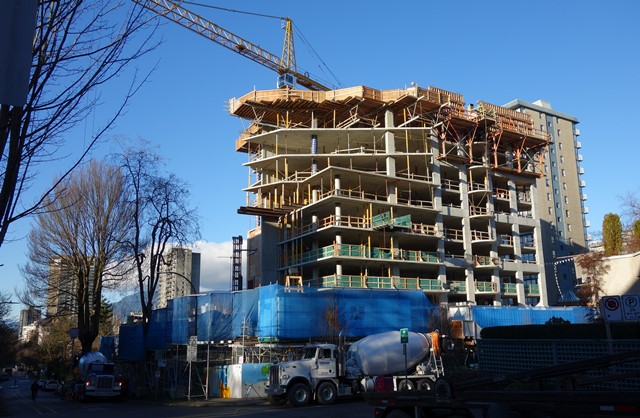The controversial highrise at Comox and Broughton under construction, earlier this week:
.
This development, one of several STIR (Short-Term Incentive for Rental) projects approved by council as part of its promotion of rental housing, was the source of considerable angst. The blowback generated petitions, public meetings, community groups, a new political party, web sites and countless rants.
But not from me. Even though I was on the council that rezoned the West End in 1989 to slow the rate of growth and limit the number of highrises that could be built on any one block, I never thought we should remove the possibility of new towers.
Reaction to new development is to be expected (‘As the rate of change slows, people’s perception and anxiety about change increases’) – to the point where, as I saw in one display, opponents labelled this tower as “unprecedented.”
‘Unprecedented’ in a neighbourhood that saw several hundred highrises built in the span of a decade and a half. A neighbourhood that is only affordable to lower-middle-income renters because of that explosive growth. A neighbourhood that was saved from the excruciating pressure of change because of the dozens of towers built in the surrounding downtown districts throughout the 1990s and 2000s.
That era is over. And unless there is at least a modicum of new accommodation built, the pressure will return – perhaps inevitably. And though, yes, this new rental housing will be more expensive (‘new’ always is), it will in time be the older stock, just as the surrounding 1960s towers, visible above, provide housing for many of those who likely opposed this development.














I think opponents of density often misunderstand economics.
They argue that the new towers are only being built to accommodate wealthier residents, which might be true.
What’s lost is the idea that by allowing the market to supply new units to wealthier individuals, pressure is relieved on older housing that can go to the poor.
Housing does not need to be a zero sum game. When we convert an unproductive parking lot into a tower capable of housing hundreds of residents, basically no one looses out. The wealthy get their condos, the poor have less competition for housing, the economy grows from construction activity, the city receives considerable tax revenue, and the environment benefits as our society becomes less car oriented. The increase in supply marginally decreases pressure on housing across the entire market, and might encourage companies to relocate to Vancouver as it becomes less unaffordable (or the rate at which it becomes less affordable slows down).
This is why I get frustrated when the protesters show up.
Well said. In other words: only increased supply will ensure lower prices / affordability for all.
Constraining new supply results in artificial subsidies of those that currently live there, at the expense of someone else who wants to move there.
If only it was that simple.
The approval of a new project leads to speculation that additional projects will be approved. Any small, old building surrounded by towers is seen to be more valuable as piece of land than as a place for people to live. Why waste time, effort and money maintaining relatively low rent housing when you can instead petition the city to let you tear it down and replace it with a new tower?
Rent controls do a good job of keeping a lid on such speculation in the housing market, but in the commercial leasing game it’s a free for all. Any hint that an area might get rezoned to allow bigger buildings sets off a series of rent increases and evictions. Despite the fact that rapid transit on Broadway could be a decade or more away and construction could make the area a dead zone for years there are many vacant shops waiting for someone to sign an inflated lease or to arrive with a backhoe. Land owners have seen what’s happening on Cambie and they want a piece of the action.
The win-win situation Spank describes above is only possible because building owners can’t ratchet up apartment rent the way they’d like to. The inability to jack up rents arbitrarily is one of many reasons why it’s hard to convince anyone to build new rental housing. Thus city hall winds up having to provide big incentives to already rich developers. Is it just me or does paying the rich to help the poor sound inefficient to you too?
“As the rate of change slows, people’s perception and anxiety about change increases”
A great line. Are you quoting someone here? I searched for the phrase but didn’t come up with anything.
I’m quoting me.
Gord.
Sent from my iPhone